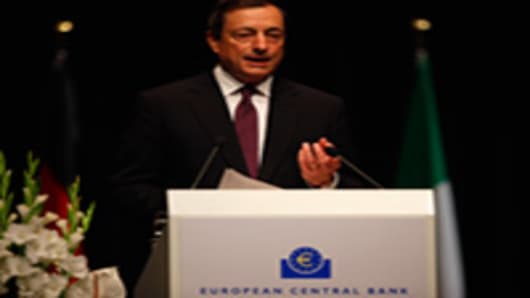The European Central Bank’s approach to monetary policy has generally not been one of “shock and awe.” And yet a surprise cut to its deposit rate last week — which takes effect Wednesday — is sending shockwaves through the market.
Last Thursday, the ECB cut its benchmark policy rate to 0.75 percent from 1 percent, a move that was widely anticipated as Europe’s debt crisis has taken a rising toll on the region’s economy and financial system.
It was the central bank’s unexpected decision to lower the interest rate on its deposit facility from 0.25 percent to 0 percent, however, that may have a bigger effect on financial markets — and not the beneficial one intended.
Already, JP Morgan , BlackRock , and Goldman Sachs are closing or restricting access to some of their money-market funds, the Financial Times reports. Why? The main effect of cutting the deposit rate — the rate the ECB pays banks for leaving funds on deposit with the central bank — to zero is to greatly increase banks’ demand for other types of high-quality, short-term holdings, said Nomura Securities strategist Guy Mandy.
This is likely to push up prices of any such instruments — like two-year German government bonds — further, in turn lowering their yields even more. (The two-year German Schatz is already in negative territory; its American counterpart is yielding just 0.26 percent) And that may just prove a kiss of death for money-market funds already struggling to offer investors any return on their holdings.
As Goldman put it to money-fund clients: “It is not currently feasible for our portfolio managers to deploy capital without substantially diluting the yield for the existing base of shareholders, since new inflows would have to be invested in securities issued at extremely low or negative yields”.
Not good for money-funds, clearly. But the deposit-rate cut also risks “serious distortions” to the financial system more broadly, Nomura cautioned. Money-funds, after all, have been a key source of funding and collateral for banks worldwide; a source that is now drying up just as collateral needs in particular are becoming more pressing. “If rates are held at current levels for anything beyond the short term, the ability for money-market funds to provide funding to banks in their previous capacity will be limited,” noted Mandy.
All told, he said, “We do not really know what the ultimate fallout of the 0 percent deposit rate will be.” The ECB might have been hoping the cut would force banks to lend funds out into the broader economy, but weak demand coupled with counterparty risk and regulatory change is likely to keep such prospects generally dim. Much greater, meanwhile, is the risk that bank funding becomes further hampered, in which case the ECB’s move will have clearly backfired.
“ECB President Draghi also seemed unsure of the reaction that banks would have when questioned at the post-meeting press conference,” Nomura noted. For investors, it is exactly the kind of bold action from the ECB they might have least wanted.
-By CNBC's Kelly Evans
@Kelly_Evans


